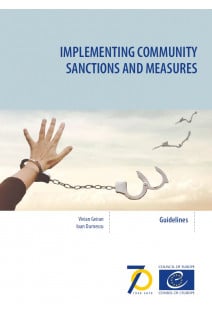These Guidelines are designed for policy makers and for management and staff of agencies implementing community sanctions and measures, and especially those responsible for the provision of what are generally known as probation services. The aim is to promote the development and implementation of community sanctions and measures across Europe and to serve as a useful source for the establishment of relevant policy and practice. As a starting point and foundation, it has the relevant standards of the Council of Europe. These Guidelines are a result of a multilateral meeting on implementation of community sanctions and measures, held in Strasbourg, in November 2018, as part of the Council of Europe co-operation activities in the penitentiary field, implemented by the Criminal Law Co-operation Unit.
1. INTRODUCTION
2. DEFINING COMMUNITY SANCTIONS AND MEASURES
3. THE COUNCIL OF EUROPE AND STANDARDS ON COMMUNITY SANCTIONS AND MEASURES, INCLUDING PROBATION
4. PROBATION ORGANISATIONS
5. PROBATION STAFF 17
a) Management
b) Staff
6. IMPLEMENTING COMMUNITY SANCTIONS AND MEASURES
6.1 Theoretical models underpinning effective practice
6.2 “Who works” literature
7. HOW TO REGULATE COMMUNITY SANCTIONS AND MEASURES
8. COMPLIANCE AND BREACH
9. WORKING WITH THE COURT
10. WORKING IN AND WITH COMMUNITIES
11. COMMUNITY SERVICE
12. RESTORATIVE JUSTICE AND THE VICTIM PERSPECTIVE
13. ELECTRONIC MONITORING
14. WORKING IN PRISONS
15. RADICALISATION AND WORKING WITH VIOLENT EXTREMIST OFFENDERS (VEOs)
16. WORKING IN PARTNERSHIP; MULTIDISCIPLINARY WORK; INTER-AGENCY CO-OPERATION
17. THE OFFENDER’S VOICE AND PERSPECTIVE
18. WORKING WITH VOLUNTEERS
19. CASE RECORD, DATA PROTECTION AND CONFIDENTIALITY
20. INSPECTION AND MONITORING
21. RESEARCH AND EVALUATION
22. RELATIONSHIP WITH THE MEDIA
23. EUROPEAN DIMENSION
24. REFERENCES
APPENDIX 1: FURTHER READING














